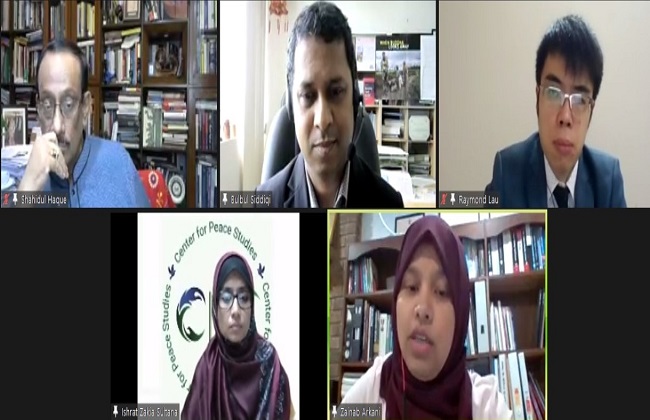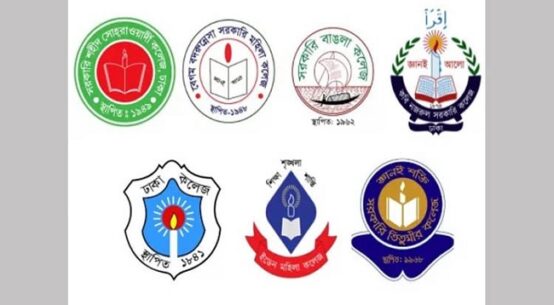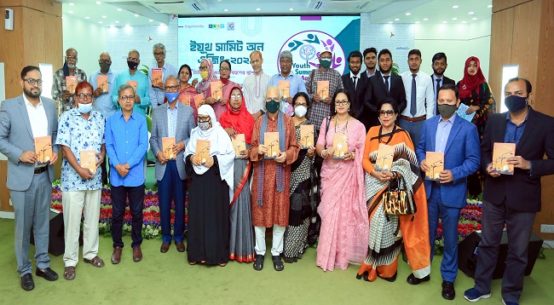
“We (Rohingya) are being played in the hands of regional geopolitics and what we feel now is hopelessness” Ms. Zainab Arkani, Founder, Rohingya Language School, Canada, says this while speaking in a webinar.
The webinar, titled ‘Remembering the Rohingya Genocide of 2017: Waiting for Justice’, was organized by the Center for Peace Studies (CPS) of the South Asian Institute of Policy and Governance (SIPG) at North South University (NSU) on 25 August 2021 to observe the Rohingya genocide day that led to the mass exodus of the Rohingya in 2017. The panelists focused on the present condition of the Rohingya in terms of their livelihood, solution to the crisis, and how to ensure justice for the Rohingya.
Ms. Zainab laid emphasis on repatriating the internally displaced people (IDP) stranded in Myanmar along with the Rohingya taking shelter in Bangladeshi camps to return to their original place of dwelling with full citizenship. She emphasized that the Rohingya diaspora perceived it as the only way to achieve a sustainable solution to the crisis. She further stated that the international community needs to invite the Rohingya diaspora to work together for the Rohingya repatriation.
While discussing the challenges of safe repatriation of the Rohingya to their homeland, former Foreign Secretary of the Bangladesh government Ambassador Shahidul Haque, now a Professorial Fellow of SIPG at NSU said that the exodus of the Rohingya is not new, it’s a recurring phenomenon. “The international community is losing its interest in the Rohingya issue and that’s pathetic. The idea of a dignified return of the Rohingya to Myanmar has become an illusion,” he added. He went on to say that as long as the military stays in power, there would be no solution to the problem.
Dr. Raymond Kwun-sun Lau, Assistant Professor, Department of Dept of Political Science and Sociology (PSS), NSU, pointed towards placing more emphasis on the timing of the interventions by the international judicial bodies to ensure justice of the Rohingya. He also discussed the Rohingya genocide referring to the mass atrocities that happened in Darfur, Sudan, and Northern Uganda. He stated that the UNSC should play more active roles in resolving the Rohingya crisis.
Dr. Ishrat Zakia Sultana, Assistant Professor, and Coordinator of CPS, NSU, discussed the livelihood challenges of the Rohingya and shared her experiences from her recent visit to Rohingya Camps. She said, “When a displaced community lives in a place for few years, the place turns into a village, the same thing happened with the Rohingya as they have developed some mechanism to manage their livelihood inside and outside the camps.” Though they are supported with the basic needs of food and shelter by the Bangladesh government, it is human nature to seek livelihood opportunities. And thus, it is very tough for Bangladeshi authority to prevent 1.1 million Rohingya from entering the local job market.
Her recent visit was to attend an art program with the Rohingya and host community children jointly organized by CPS and Artolution. This program was positively accepted by both the communities. She emphasized the importance of art to create social cohesion and eliminate misconceptions about each other. And she finally urged that the repatriation and resettlement process of the Rohingya should be expedited in parallel to resolve this worst humanitarian crisis.
Ambassador Sufiur Rahman, High Commissioner for the People’s Republic of Bangladesh to Australia, New Zealand, and Fiji, stated that in Myanmar, majoritarianism is taking on a new shape. If the NUG, Myanmar’s ethnic parties, and the international community continue to remain engaged on this issue, it is possible to subjugate the military and thus a solution is likely to emerge. Conversely Brig. Gen. M. Sakhawat Hussain, Ph.D., (retd), Senior Fellow of SIPG, NSU opined that it is very hard to overpower the Myanmar Military and thus the quick solution to this crisis is very bleak now.
Dr. Bulbul Siddiqi, Associate Professor and Director of Confucius Institute, NSU, moderated the webinar. He highlighted the importance of observing this Rohingya genocide remembrance day and hopes that the Rohingya will get back all of their rights and peacefully repatriate to Myanmar. Rohingya diaspora, diplomats, academics, lawyers, journalists,and students were present among the participants.The webinar ended with observing one-minute silence in remembrance of the Rohingya who were the victims of the genocide and atrocity in 2017.


